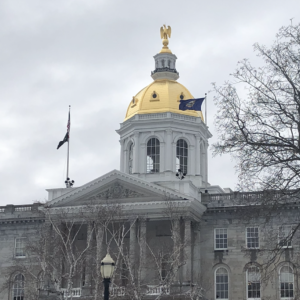On Thursday, the New Hampshire Senate passed SB 130, a bill to create Educational Freedom Accounts (EFAs) on a 14-10 party-line vote with Democrats unified in opposition.
EFAs allow families to take the state portion of education funding that would have been sent to their assigned school on the student’s behalf and instead give it to parents — “funding the student, not the system,” as advocates call it. Parents could then invest it in other educational choices, from sending kids to a public school in a different district to public charters to private education.
“This is landmark legislation that will bring innovation to our school systems and help every child find the best educational path possible,” said Majority Leader Jeb Bradley after the vote. “The pandemic has shown us that we are way beyond the one-size-fits-all way of thinking when it comes to learning. The vast majority of parents will continue to send their children to their local public school, but for those parents who want a choice, EFA’s give them that option, especially if they are from lower-income households.”
Democrats, strong allies of the teachers unions who oppose any form of parental choice, declared the legislation a disaster that would drastically cut revenues for public schools. “Republicans just voted to siphon tax dollars from public schools to unaccountable private schools. SB 130 will hurt our students and will cost overburdened Granite State property taxpayers millions of dollars,” the state Democratic Party tweeted.
However, a new study from the Josiah Bartlett Center for Public Policy refuted many of the Democrats’ fears. Dee Jurius, a community education fellow at the Josiah Bartlett Center for Public Policy, told NHJournal EFAs will save Granite State taxpayers money.
“The Education Freedom Accounts in SB 130 would save taxpayers $6.65 million in the program’s first two years, improve students’ lifetime earnings by more than $30 million, and generate nearly $13 million in economic benefits for the state, our analysis shows,” Jurious said. “Those are just some of the financial benefits of offering an individualized education. The big educational benefit will go to the families who finally have the ability to pursue an education that best fits the needs of their child.”
During Thursday’s debate, Sen. Bob Giuda, R-Warren, echoed those sentiments. “The opposition centers on the preservation of an institution even if it is at the expense of the children who attend. This bill attempts to care for the children whom our schools don’t work for.”
But Democrats like State Sen. David Watters (D-Dover) rejected the premise of parental control and individual choice. “The elevation of so-called personal freedom over common good contradicts the most fundamental conservative values once enshrined in both parties. Public good, public education are the common ground of our equality and prosperity.”
His fellow Democrat, Senate Minority Leader Donna Soucy, called the bill “flawed and unconstitutional.”
“The NH Constitution prohibits taxpayer dollars from being directed to private or religious schools. Now more than ever, when legislators on both sides of the aisle have identified property taxpayer relief as a priority, it is difficult to understand why we would remove safeguards for the use of taxpayer dollars and ask hardworking Granite Staters to pay for the private education of other children and families.”
Soucy’s appeal is an interesting one. The section she refers to is commonly referred to as a “Blaine Amendment,” part of a national movement of anti-Catholic bigotry in the 19th century. The U.S. Supreme Court struck down Montana’s Blaine amendment in 2020. Invoking language promoting religious bigotry to defend the NH Democratic Party’s position is an unusual step.
Democrats offered other arguments in opposition as well, including fears that schools would lose large numbers of students — and the funding that goes with them — if school choice becomes state policy.
However, the same Bartlet Center study projecting millions in taxpayer savings also found that, in the program’s first year, fewer than three students on average would leave each school district. Nearly one thousand Granite State students in total will likely take advantage of the program in its first year. In its second year, Bartlett expects nearly 2,500 students to use the program.
There are currently more than 165,000 K-12 students enrolled in New Hampshire’s public schools.
New Hampshire Commissioner of Education Frank Edelblut praised the legislation.
“I am encouraged by the Senate actions today on Senate Bill 130. This moves forward the important policy of creating education options for all families and is a big step in the process of ensuring that all families and students across the state have a voice in their education,” Edelblut said. “Choice programs such as this are taking shape in states across the country, and it is only a matter of time before New Hampshire finds a place for a similar policy in our state.”
After the legislation passed, the Senate tabled it rather than sending it on to the Senate Finance Committee, the usual legislative route. Observers believe this is a sign the GOP leadership hopes to roll the measure into the state budget, rather than having it face a standalone vote in the House where, despite the Republican majority, its fortunes are far from certain.




